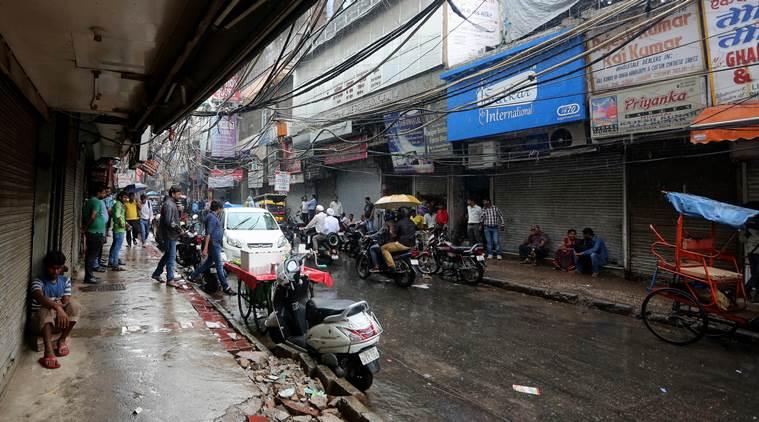COVID-19: Any Decision Sans Financial Package Won’t Help, Say Traders

Representational image. | Image Courtesy: Indian Express
New Delhi: The outbreak of the COVID-19 pandemic and the subsequent shutdown in most states is not only impacting people’s health but also creating economic disruption, causing huge loss to business community across the country.
While the government has been focussing on preventive measures rather than strengthening the healthcare sector, it also seems to be ill-prepared to address the economic disruptions, broken demand and supply chains. However, the Union Ministry of Finance — with an aim to provide a relief to the business community — has extended compliance deadlines for individuals to June 30, 2020.
The government has extended deadlines for filing belated income tax returns (ITR) for the financial year 2018-19 to June 30 from March 31. Penalty for delayed payment for tax payments have also been reduced to 9% from 12%. No fine will be imposed if it is filed till June 30. Interest rate for delayed TDS deposits has been reduced from 18% to 9%.
The deadline for GST filing for the March-May quarter has been extended till June 30. There will be no fine on delay in filing GST by the companies with a turnover of less than Rs 5 crore. The deadline for settling disputes under the Vivad Se Vishwas Scheme has also been extended to June 30. The last date of linking Aadhaar with PAN has been extended till June 30.
Also read: Gujarat: Farmers, Industries Hit Due to COVID-19 Lockdown
Though the medium and small-sized business entities have welcomed the government decisions, they have demanded the Centre to announce financial package for them in order to sustain their enterprises — which largely employ daily wage workers, mostly migrants.
While the government has imposed a complete lockdown in many states across the country to spread community transmission of the novel virus, the migrant and marginal workers employed in the Micro, Small & Medium Enterprises (MSMEs) are facing a double whammy in the wake of economic disruptions.
Reacting to the government’s decision to deal with the fall out of the pandemic, Rakesh Kumar Yadav, president of the Federation of Sadar Bazar Trade Association, told NewsClick these are welcome steps, but not sufficient to bring the collapsing economy back on the track.
“We are incurring a huge loss. Roughly, the daily turnover of Sadar Bazaar, one of the largest wholesale markets of household items, stands somewhere between Rs 200 crore to Rs 250 crore, which has now gone down to zero. We had begun witnessing the slump in our business three-four days before the lockdown was announced. There was a sharp decline in footfall. The blockade, if extended, will completely break the demand-supply chain, which will take at least next five-six months to recover. Therefore, the government must consider it and do something meaningful. Though dates have been extended, the payments have to be made. Our payments are stuck in the market because retailers are not coming. How will we be able to file taxes when there is no rotation of money in the market,” he said.
Also read: COVID-19 Lockdown: Weddings Postponed, Gatherings Cancelled in Bihar
The industry that seems to have suffered the most is tourism. Shailendra Srivastava, president of The Indigenous Federation of Tourism Integrity (TIFTI), said his industry would be the last to recover because of the pandemic. “When this stage passes, as we hope and pray, our industry would take a lot of time if compared with others to come back on track. Majority of those who are in this business are very small players. Our life is based on installments. We earn money on daily basis, pay installments and spend the rest on family and other expenses. We have a great challenge ahead as we are not industrialists. Generally, a tour operator hires three-four people, the income is distributed among them. Though we are not raising any demand right now, but we will urge the government post March 31 to think about supporting us for our survival,” he added.
Others are also not very happy with the government’s decision. They said they don’t need “tokenism”, what they want is “proper support” and relief package.
“As we started recovering from demonetisation, we were hit by the GST,” Mukesh Sachdeva, general secretary of the Delhi Hindustani Mercantile Association (DHMA), a body of textile traders that claims to represent around 5,000 shops in Chandni Chowk, told NewsClick.
He added that the traders have still not come to terms with the new taxation system, which continues to cause them inconvenience. “Now, the coronavirus has further broken us. Its impact on the industry will be there for next six months to one year. The orders of the traders had have now been cancelled. No consignment can either be sent or received because of the ban on transport services. All payments are stuck here and there because there is no sale and purchase. When there will be no customer, how will a retailer be able to pay to his stockist? And if we will not get payment, we cannot make payments to the manufacturers,” he said.
If things do not improve, he fears, the situation will worsen. “Despite the fact that there is no business, every trader has to pay his employees who cannot be fired. He has to bear different kind of expenses such as taxes, rent, etc. Only time will tell how will we recover. The share market is crashing every day. We demand the government that we should be given further relaxations,” he added, without elaborating the kind of relaxation his industry seeks.
Tarun Gupta, president of Chandni Chowk’s Dariba Jewellers Association, which has 500 retailers, said “motivational speeches” and “lofty promises” won’t work any longer and that the government needs to go extra miles.
Also read: COVID-19: After Demo and GST, Textile Industry Braces For Another Impact
“The performance of the gold and jewellery industry can be assessed in two parts — one before corona outbreak and the other post outbreak. The future is always based on past and present. Our industry’s health was not good even before the pandemic. Collapse of banks, IL&FS (Infrastructure Leasing & Finance Services) crisis, all these happened in the past one year and impacted us beyond repair. The government is not ready to compromise its own revenue. When the price of crude oil witnessed a dip in the international market, we witnessed a hike of Rs 3 per litre in petrol prices. The GST on mobile phone has been increased. The government has not given a relief to the business community. The government always talks about ease of doing business, but we don’t see any honest effort on the ground,” he complained.
He further said those who are small jewellers are going to face a tough time ahead. Big brands, according to Gupta, will survive but they do not cater a large market.
“It is the small jewellers who have a wider reach in smaller towns and villages. Brands only constitute 15 % of the total jewellers community, the rest are small jewellers. Marriages have been postponed. It will take time to recover. The government if it is concerned about us should either give us further tax rebates or at least not increase it. Agar kamai nahin ho rahi hai to mere kharche men hi suvidha ho jaye (if there is no income, there should be a relaxation in expenses). If nothing happens, at least 25% of the industry will collapse. Those who are medium scale or large scale jewellers have a lot of expenses. With the demand going down, they will also face the consequences. We are going to face a possible crisis when the lockdown will be lifted,” he said.
He further added, “Our industry is a kind of stable industry which normally does not see rapid growth or slump. The reason is that its working capital is considered to be above 70%. But of late, it has not continued that way. We have always been burdened with tax and custom duty. Recently, we witnessed a hike of 2.5% in custom duty. We give 12.5% custom duty, 3% GST. With the government hell-bent on making hallmark compulsory, though it is good for customers, how will jewellers in tier 3 and 4 cities be able to do business? The government will have to see the practicality of its decision. Taking decision in AC rooms won’t do any good.”
Get the latest reports & analysis with people's perspective on Protests, movements & deep analytical videos, discussions of the current affairs in your Telegram app. Subscribe to NewsClick's Telegram channel & get Real-Time updates on stories, as they get published on our website.
























